2024届高考英语语法专题复习代词课件(共34张PPT)
文档属性
| 名称 | 2024届高考英语语法专题复习代词课件(共34张PPT) | 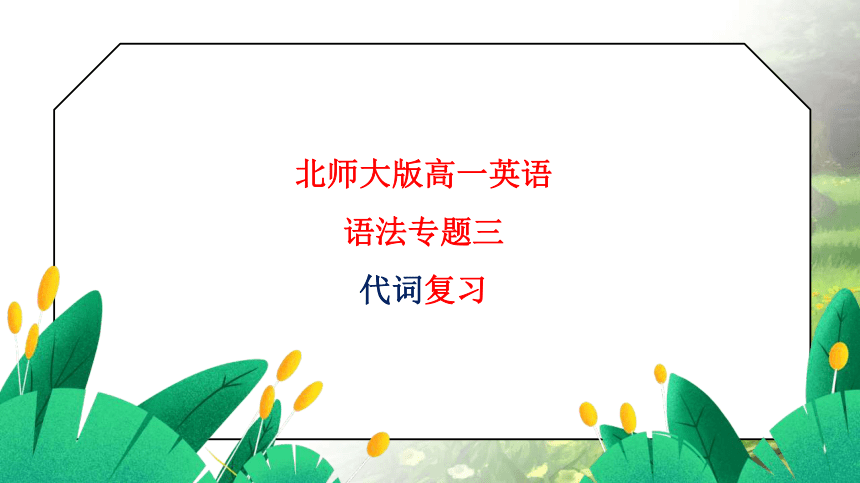 | |
| 格式 | pptx | ||
| 文件大小 | 4.2MB | ||
| 资源类型 | 教案 | ||
| 版本资源 | 通用版 | ||
| 科目 | 英语 | ||
| 更新时间 | 2024-02-29 18:03:38 | ||
图片预览

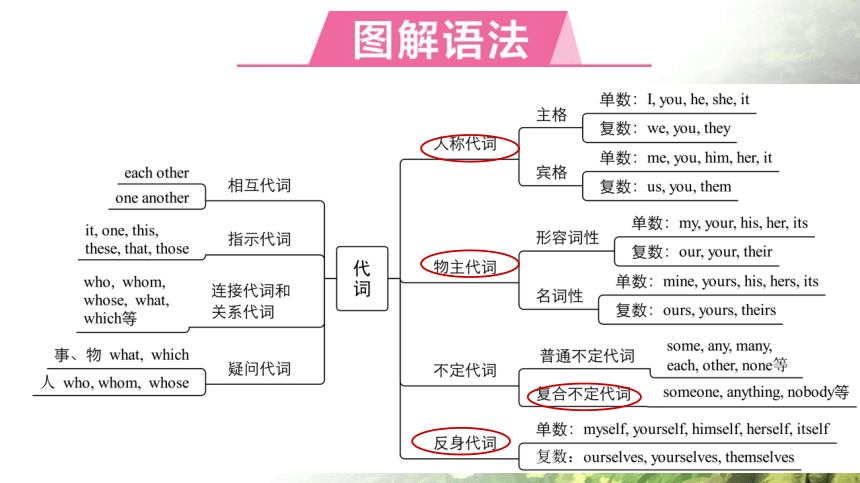

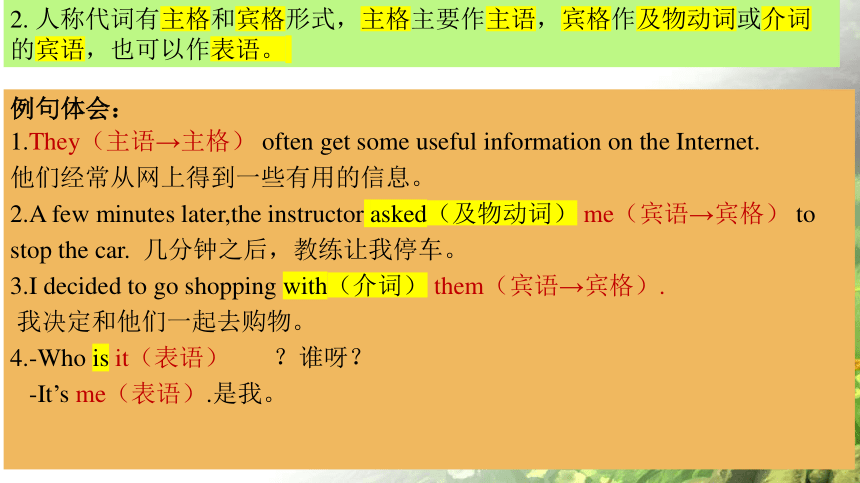
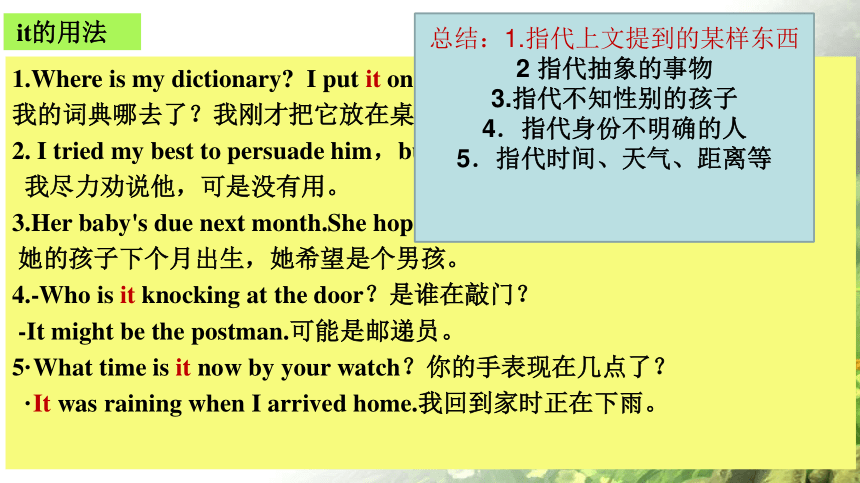
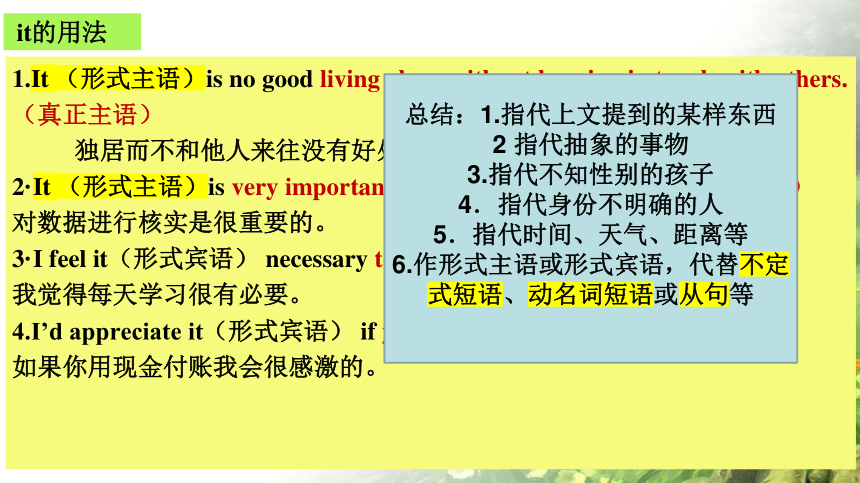
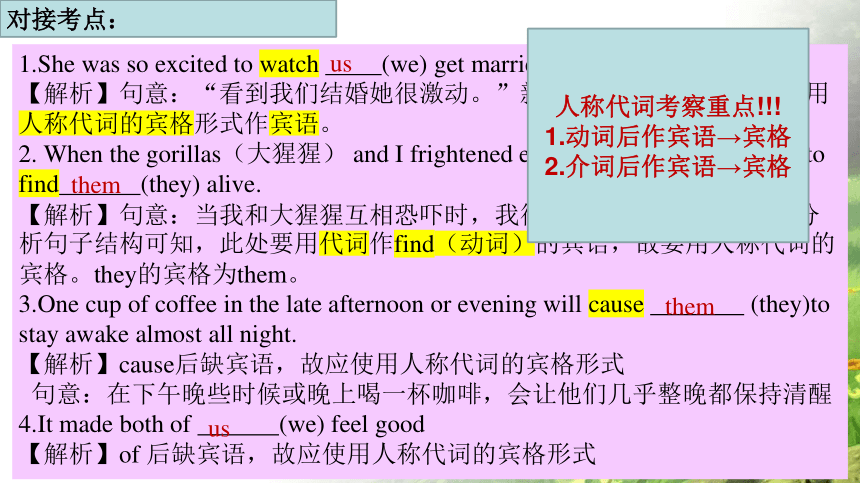
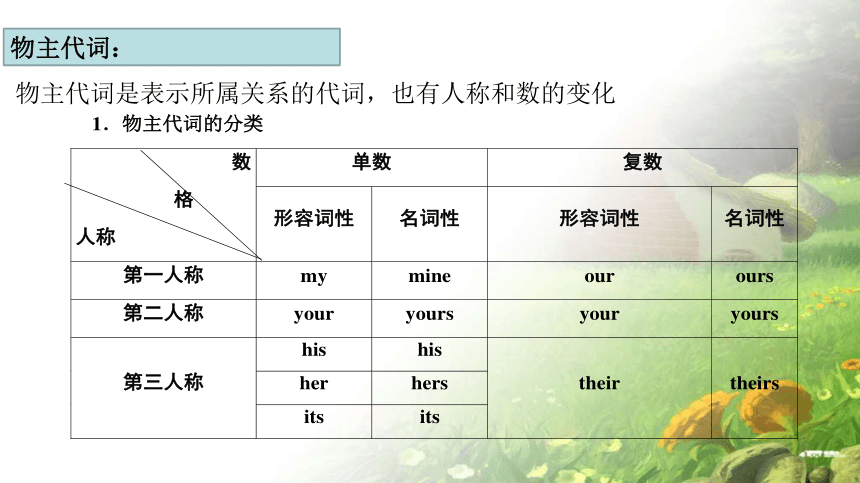
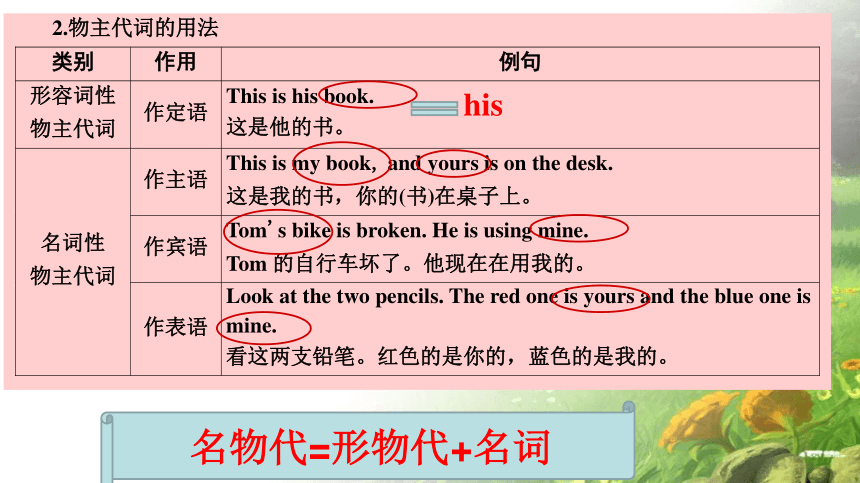
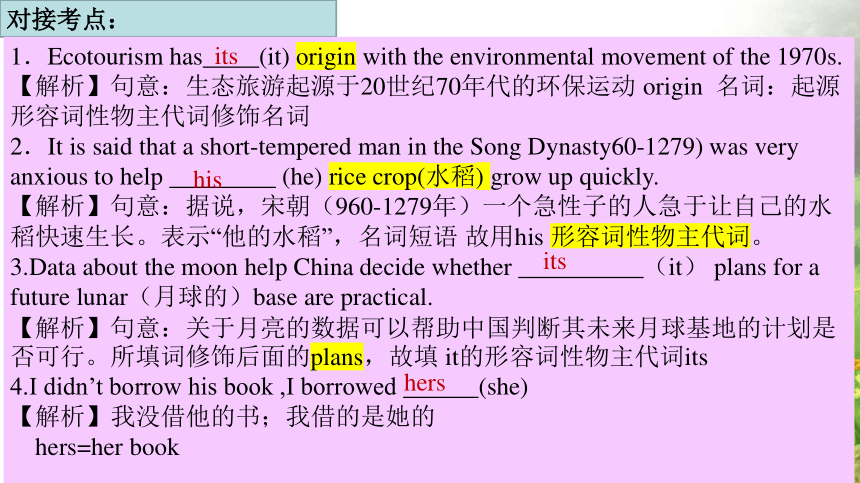
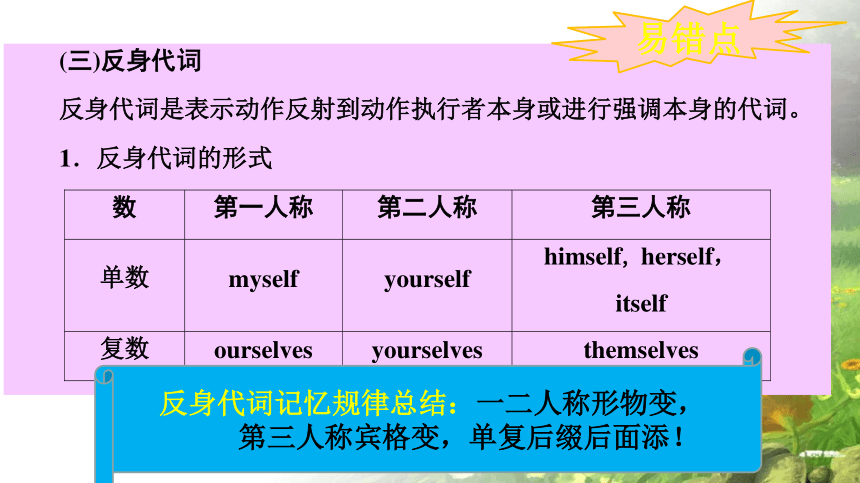

文档简介
(共34张PPT)
北师大版高一英语
语法专题三
代词复习
人称代词:
1.人称代词:
不仅指人,也可以指物,有人称、数和格的变化。
重点
2. 人称代词有主格和宾格形式,主格主要作主语,宾格作及物动词或介词的宾语,也可以作表语。
例句体会:
1.They(主语→主格) often get some useful information on the Internet.
他们经常从网上得到一些有用的信息。
2.A few minutes later,the instructor asked(及物动词) me(宾语→宾格) to stop the car. 几分钟之后,教练让我停车。
3.I decided to go shopping with(介词) them(宾语→宾格).
我决定和他们一起去购物。
4.-Who is it(表语) ?谁呀?
-It’s me(表语).是我。
it的用法
1.Where is my dictionary I put it on the table just now.
我的词典哪去了?我刚才把它放在桌子上了。
2. I tried my best to persuade him,but it didn’t help.
我尽力劝说他,可是没有用。
3.Her baby's due next month.She hopes it will be a boy.
她的孩子下个月出生,她希望是个男孩。
4.-Who is it knocking at the door?是谁在敲门?
-It might be the postman.可能是邮递员。
5·What time is it now by your watch?你的手表现在几点了?
·It was raining when I arrived home.我回到家时正在下雨。
总结:1.指代上文提到的某样东西
2 指代抽象的事物
3.指代不知性别的孩子
4.指代身份不明确的人
5.指代时间、天气、距离等
it的用法
1.It (形式主语)is no good living alone without keeping in touch with others.(真正主语)
独居而不和他人来往没有好处。
2·It (形式主语)is very important that the data be verified.(真正主语)
对数据进行核实是很重要的。
3·I feel it(形式宾语) necessary to learn every day(真正宾语).
我觉得每天学习很有必要。
4.I’d appreciate it(形式宾语) if you pay in cash(真正宾语).
如果你用现金付账我会很感激的。
总结:1.指代上文提到的某样东西
2 指代抽象的事物
3.指代不知性别的孩子
4.指代身份不明确的人
5.指代时间、天气、距离等
6.作形式主语或形式宾语,代替不定式短语、动名词短语或从句等
对接考点:
1.She was so excited to watch (we) get married,” the bride said.
【解析】句意:“看到我们结婚她很激动。”新娘说。动词watch后需要用人称代词的宾格形式作宾语。
2. When the gorillas(大猩猩) and I frightened each other,I was just glad to find (they) alive.
【解析】句意:当我和大猩猩互相恐吓时,我很高兴看到它们还活着。分析句子结构可知,此处要用代词作find(动词)的宾语,故要用人称代词的宾格。they的宾格为them。
3.One cup of coffee in the late afternoon or evening will cause (they)to stay awake almost all night.
【解析】cause后缺宾语,故应使用人称代词的宾格形式
句意:在下午晚些时候或晚上喝一杯咖啡,会让他们几乎整晚都保持清醒
4.It made both of (we) feel good
【解析】of 后缺宾语,故应使用人称代词的宾格形式
us
them
them
人称代词考察重点!!!
1.动词后作宾语→宾格
2.介词后作宾语→宾格
us
物主代词:
物主代词是表示所属关系的代词,也有人称和数的变化
名物代=形物代+名词
his
对接考点:
1.Ecotourism has (it) origin with the environmental movement of the 1970s.
【解析】句意:生态旅游起源于20世纪70年代的环保运动 origin 名词:起源 形容词性物主代词修饰名词
2.It is said that a short-tempered man in the Song Dynasty60-1279) was very anxious to help (he) rice crop(水稻) grow up quickly.
【解析】句意:据说,宋朝(960-1279年)一个急性子的人急于让自己的水稻快速生长。表示“他的水稻”,名词短语 故用his 形容词性物主代词。
3.Data about the moon help China decide whether (it) plans for a future lunar(月球的)base are practical.
【解析】句意:关于月亮的数据可以帮助中国判断其未来月球基地的计划是否可行。所填词修饰后面的plans,故填 it的形容词性物主代词its
4.I didn’t borrow his book ,I borrowed (she)
【解析】我没借他的书;我借的是她的
hers=her book
its
his
its
hers
反身代词记忆规律总结:一二人称形物变,
第三人称宾格变,单复后缀后面添!
易错点
常见固搭要记牢!!!
(二)含有反身代词的习惯用语
be oneself(人)处于正常状态
by oneself 独自地;单独地
for oneself 亲自
behave oneself 举止规矩
of oneself 自发地
speak to oneself 自言自语
dress oneself 自己穿衣
help oneself to 随便吃/用
对接考点:
1.She was extremely pretty,and her house was a re-flection of (she),everything in good taste and in perfect order.
【解析】句意:她非常漂亮,并且她的房子就是她的写照,每件东西都很有品味且摆放整齐。
2.As well as looking at exhibits,visitors can play with computer simulations(模拟)and imagine (they) living at a different time in history.
【解析】句意:除了观赏展品,参观者还可以玩电脑模拟游戏,想象自己生活在一个不同的历史时期。主语是visitors,故用反身代词。
3.Nervously facing challenges, I know I will whisper to (I) the two simple words “Be yourself".
【解析】句意:我紧张地面对挑战,知道我将轻声对自己说两个简单的词-“Be yourself”。本句的主语是I,当宾语与主语是指同一个人时,宾语要用反身代词。.
herself
themselves
myself
指示代词:
指示代词:用来标记人或事的代词,表示“这个/些” “那个/些”
指示代词 用法
this/these 1指在时间或空间上较近的人或事物;
2.this也可指下文将要谈到的人或物,起启下的作用。
3.即将要发生的事情
that/those 1.指在时间或空间上较远的人或事物;
2.that也可指上文提到过的人或物,起承上的作用。
3.已经完成的事情
1. This is my friend Charlie Brown.这是我的朋友查理·布朗。(近指)
2. This gift is for you and that one is for your brother.
这件礼物是给你的,那件是给你弟弟的。(this近指,that远指)
3. I‘ve finished all my homework,Mum.妈妈,我做完所有的作业了。
-That’s nice.那太好了 (刚提到过的事情或已经完成的事情用that)
4. -I'm going hiking this weekend.本周末我要去徒步旅行。
-This is very exciting.这真是太令人激动了。
(即将要发生或将要提到的事情用this)
例句体会:
不定代词:
不明确指代某个/些人、某个/些事物的代词叫作不定代词。
不定代词可以代替名词跟形容词;没有主格宾格之分;在句中可做主语、宾语、表语、定语。
词义 指代 都 任何一个
都不
两者 both either
neither
三者或三者以上 all any none
either、neither的用法
一.either指两者中的“任意一个”,可作主语、宾语、定语。作主语时,谓语动词常用单数
1. -Do you want tea or coffee?你想喝茶还是喝咖啡?
-Oh,I don't mind. Either will do.(主语)
2.· There are two apples. You may take either.
桌上有两个苹果,你可以随便拿一个。(宾语)
3.·The offices on either side are empty.
两边的办公室都是空的。(定语)
二.neither 指两者中的任何一个“都不”,其结构、用法与either相同
1. Neither of my parents allows me to study medicine.
我父母都不允许我学医。(主语)
2. ·You talked about Bill and Fagan, but I know neither.
你谈到比尔和费根,但这两个人我都不认识。(宾语)
3.Neither statement you provide holds water.
你所陈述的两个观点没有一个能站得住脚。(定语)
代词 用法
none (1)特指语境中提到的人或物,强调数量。
(2)后可接of短语,可回答以how many, how much引导的特殊疑问句。
nothing (1)指物,表示泛指。
(2)不可接of短语,可回答what引导的特殊疑问句。
no one/nobody (1)常指人,仅用于指代可数名词单数。
(2)不可接of短语,可回答以who引导的特殊疑问句。
none, nothing与no one/nobody的区别
1.He felt hungry, but he could find nothing to eat in the kitchen.
他饿了,但在厨房里他没有找到吃的东西。
(泛指所有吃的东西,不是特指某一种。)
2. They asked for nine books, but there is/are none in the library at present. 他们需妥9本书,但目前图书馆一本都没有。
(特指前面提到的书)
3.Did anyone want to attend the meeting? 有人想去参加会议吗?
— No,no one/nobody wanted to. 不,没有人想去
例句体会:
代词 用法
each (1)强调个体,可作代词和形容词,修饰单数可数名词,指两者或两者以上中的“每一个”。
(2)可以与of 短语连用;可作主语、宾语、同位语和定语。作主语时,谓语动词用单数形式;
every (1)强调(整体中的)每一个,只能作定语,修饰单数可数名词,表示三者或三者以上中的“每一个”。
(2)与not连用构成部分否定。
(3)可用来表示“每隔”。
(4)不可与of短语连用。
each与every的区别
例句体会:
1.Each(主语) of us must take responsibility for our own actions.
我们每个人都必须对自己的行为负责
2.The teacher assigned each of the children(宾语) a different task.
老师给每个儿童都布置了不同的作业
3.They each have their own e-mail address.(作同位语。)
他们每个人都有自己的电子邮件地址。
4.Each child will find his own personal road to success.(作定语。)
每个孩子都会找到自己的成功之路。
5.Every dog has its day.(作定语)
人人皆有得意时。
6. I can't remember every(作定语) little detail.
我记不住每一个微小的细节。
one. ones. the one. the ones.that.those 的区别
代词 用法
one 代指可数名词,单数,泛指
ones 代指可数名词,复数,泛指
the one 代指可数名词,单数,特指
the ones 代指可数名词,复数,特指
that 代指不可数名词或可数名词单数,相当于the one
those 代指可数名词,复数,特指(=the ones)
例句体会:
1.Mr.Zhang gave me a very valuable present, one(特指) that I had never seen.张先生给了我一件很有价值的礼物,一件我从来没见过的礼物。
2. 10 o'clock is too late for the little ones(泛指).
十点钟对那些小家伙来说就太晚了。
2.I think the chairs made of wood cost more than those/the ones made of bamboo.我认为木头做的椅子比竹子做的椅子贵。
3.I don't like the cellphone,the one you just showed me.the我不喜欢那部手机,就是你刚才给我看的那一部。
(the one 指代前面的cellphone,而且是同一个事物)。
4.This machine is better than that (特指去年那个)we bought last year.
这台机器比我们去年买的那台好。
the other, another, others与the others的区别 的区别
代词 用法
the other 1.可单独使用,特指两者中的“另一个”或两部分中的“另一部分”,常与one连用,
构成“one ..., the other ...”,表示“一个……,另外一个……”。
another 1.泛指三者或三者以上的人或物中的“另一个”,代替单数可数名词。
2.another后可接“基数词/few+复数名词(名词表示的事物被看作一个整体)”,表示“另外的……(多少)”。
others 1.只能单独使用,表示泛指意义,意为“其他的人或事物”,常与some连用。
the others 1.特指“整体中除去一部分后剩余的全部人或事物”时用the others。
例句体会:
1.Some are Chinese; others(泛指其他的人) are Japanese.
一些是中国人,其他的是日本人。
2.The other (另一部分)books are here.
另一些书在这里。
3.One is red;the other (两者之中的另一个)is blue.
一个是红色的,另一个是蓝色的。
4.The others(剩下的部分) are handed in.
其他的上交了
5.I don't like the room. I will ask for another(三者以上中的一个).
我不喜欢这个房间。我想另要一间。
6.He will stay there for another three days(另外的三天)
他还要在那里待上三天
表示数量的不定代词的用法
代词 用法 表示意义 含义
few 修饰或代替可数名词 否定含义 几乎没有
a few 修饰或代替可数名词 肯定含义 几个;一些
little 修饰或代替不可数名词 否定含义 几乎没有
a little 修饰或代替不可数名词 肯定含义 少量;一点点
many 修饰或代替可数名词 肯定含义 许多
much 修饰或代替不可数名词 肯定含义 许多
例句体会:
1.Many have been asked, but few are ableto answer.
问了很多人,但很少有人能回答。
2.We needn't hurry. There is much time left.
我们没有必要着急,还剩下很多时间。
3.Many know him but few like to make friends with him.
很多人认识他,但几乎没有人愿意跟他交朋友。
4.Quite a few \ many people go to the beach to enjoy the nice weather.
很多人去海滩享受好天气。
5.He did business and earned quite a little \ much money.
他做生意挣了不少钱。
6.For years we had little knowledge of what life was like inside China.
以往很多年我们对于中国国内的生活情况所知甚少
复合不定代词
every some any no
thing everything something 某事 anything 任何事 nothing
没事
body everybody somebody 某人 anybody 任何人 nobody
没人
one everyone someone 某人 anyone none
没人
复合不定代词用法:
1.复合不定代词在句中作主语时,谓语动词用单数形式
Something is wrong with my bike.我的自行车坏了
2.修饰复合不定代词的定语要后置
There is something wrong with his left eye.
他的左眼出问题了
Would you like something cold to drink(to do不定式作定语)
你要喝凉的东西吗?
Everyone in my family (介词短语作定语)likes shopping.
我家人人喜欢购物。
1.(2020·哈三中质检) By that time, the panda no longer needed (it)mother for food. 2.(2020.绥化一中三模)A few hours earlier, I’d been at home in Hong Kong, with (it) choking smog. 3.The girl was sitting on the chair quietly, burying ______ (she) in the magazine in the hands.4.My father kept _________(him) word and treated me to a wonderful sightseeing trip after I won the contest.5.I wish to thank Mr. Smith, and without ________(he) help I would never have got this far.6.However, he later finds out that his father was a wizard, and that his mother was a witch, both of ________ (they)murdered by an evil wizard.
课堂检测
7.If you want to go to the party with me, you should behave (you) well.8.Generation after generation, our forefathers worked hard and created a splendid culture on this land of _________________(us).9.No matter when I go to a post office and no matter where the post office is, I always find ________ (me) standing in a line behind someone who has a lot of business to do.10. On my recent visit, I help a lively three-month-old twin that had been rejected by ______ (it) mother.
答案:its. its.herself.his.his.them.yourself.ours.myself.their
Thank you !
北师大版高一英语
语法专题三
代词复习
人称代词:
1.人称代词:
不仅指人,也可以指物,有人称、数和格的变化。
重点
2. 人称代词有主格和宾格形式,主格主要作主语,宾格作及物动词或介词的宾语,也可以作表语。
例句体会:
1.They(主语→主格) often get some useful information on the Internet.
他们经常从网上得到一些有用的信息。
2.A few minutes later,the instructor asked(及物动词) me(宾语→宾格) to stop the car. 几分钟之后,教练让我停车。
3.I decided to go shopping with(介词) them(宾语→宾格).
我决定和他们一起去购物。
4.-Who is it(表语) ?谁呀?
-It’s me(表语).是我。
it的用法
1.Where is my dictionary I put it on the table just now.
我的词典哪去了?我刚才把它放在桌子上了。
2. I tried my best to persuade him,but it didn’t help.
我尽力劝说他,可是没有用。
3.Her baby's due next month.She hopes it will be a boy.
她的孩子下个月出生,她希望是个男孩。
4.-Who is it knocking at the door?是谁在敲门?
-It might be the postman.可能是邮递员。
5·What time is it now by your watch?你的手表现在几点了?
·It was raining when I arrived home.我回到家时正在下雨。
总结:1.指代上文提到的某样东西
2 指代抽象的事物
3.指代不知性别的孩子
4.指代身份不明确的人
5.指代时间、天气、距离等
it的用法
1.It (形式主语)is no good living alone without keeping in touch with others.(真正主语)
独居而不和他人来往没有好处。
2·It (形式主语)is very important that the data be verified.(真正主语)
对数据进行核实是很重要的。
3·I feel it(形式宾语) necessary to learn every day(真正宾语).
我觉得每天学习很有必要。
4.I’d appreciate it(形式宾语) if you pay in cash(真正宾语).
如果你用现金付账我会很感激的。
总结:1.指代上文提到的某样东西
2 指代抽象的事物
3.指代不知性别的孩子
4.指代身份不明确的人
5.指代时间、天气、距离等
6.作形式主语或形式宾语,代替不定式短语、动名词短语或从句等
对接考点:
1.She was so excited to watch (we) get married,” the bride said.
【解析】句意:“看到我们结婚她很激动。”新娘说。动词watch后需要用人称代词的宾格形式作宾语。
2. When the gorillas(大猩猩) and I frightened each other,I was just glad to find (they) alive.
【解析】句意:当我和大猩猩互相恐吓时,我很高兴看到它们还活着。分析句子结构可知,此处要用代词作find(动词)的宾语,故要用人称代词的宾格。they的宾格为them。
3.One cup of coffee in the late afternoon or evening will cause (they)to stay awake almost all night.
【解析】cause后缺宾语,故应使用人称代词的宾格形式
句意:在下午晚些时候或晚上喝一杯咖啡,会让他们几乎整晚都保持清醒
4.It made both of (we) feel good
【解析】of 后缺宾语,故应使用人称代词的宾格形式
us
them
them
人称代词考察重点!!!
1.动词后作宾语→宾格
2.介词后作宾语→宾格
us
物主代词:
物主代词是表示所属关系的代词,也有人称和数的变化
名物代=形物代+名词
his
对接考点:
1.Ecotourism has (it) origin with the environmental movement of the 1970s.
【解析】句意:生态旅游起源于20世纪70年代的环保运动 origin 名词:起源 形容词性物主代词修饰名词
2.It is said that a short-tempered man in the Song Dynasty60-1279) was very anxious to help (he) rice crop(水稻) grow up quickly.
【解析】句意:据说,宋朝(960-1279年)一个急性子的人急于让自己的水稻快速生长。表示“他的水稻”,名词短语 故用his 形容词性物主代词。
3.Data about the moon help China decide whether (it) plans for a future lunar(月球的)base are practical.
【解析】句意:关于月亮的数据可以帮助中国判断其未来月球基地的计划是否可行。所填词修饰后面的plans,故填 it的形容词性物主代词its
4.I didn’t borrow his book ,I borrowed (she)
【解析】我没借他的书;我借的是她的
hers=her book
its
his
its
hers
反身代词记忆规律总结:一二人称形物变,
第三人称宾格变,单复后缀后面添!
易错点
常见固搭要记牢!!!
(二)含有反身代词的习惯用语
be oneself(人)处于正常状态
by oneself 独自地;单独地
for oneself 亲自
behave oneself 举止规矩
of oneself 自发地
speak to oneself 自言自语
dress oneself 自己穿衣
help oneself to 随便吃/用
对接考点:
1.She was extremely pretty,and her house was a re-flection of (she),everything in good taste and in perfect order.
【解析】句意:她非常漂亮,并且她的房子就是她的写照,每件东西都很有品味且摆放整齐。
2.As well as looking at exhibits,visitors can play with computer simulations(模拟)and imagine (they) living at a different time in history.
【解析】句意:除了观赏展品,参观者还可以玩电脑模拟游戏,想象自己生活在一个不同的历史时期。主语是visitors,故用反身代词。
3.Nervously facing challenges, I know I will whisper to (I) the two simple words “Be yourself".
【解析】句意:我紧张地面对挑战,知道我将轻声对自己说两个简单的词-“Be yourself”。本句的主语是I,当宾语与主语是指同一个人时,宾语要用反身代词。.
herself
themselves
myself
指示代词:
指示代词:用来标记人或事的代词,表示“这个/些” “那个/些”
指示代词 用法
this/these 1指在时间或空间上较近的人或事物;
2.this也可指下文将要谈到的人或物,起启下的作用。
3.即将要发生的事情
that/those 1.指在时间或空间上较远的人或事物;
2.that也可指上文提到过的人或物,起承上的作用。
3.已经完成的事情
1. This is my friend Charlie Brown.这是我的朋友查理·布朗。(近指)
2. This gift is for you and that one is for your brother.
这件礼物是给你的,那件是给你弟弟的。(this近指,that远指)
3. I‘ve finished all my homework,Mum.妈妈,我做完所有的作业了。
-That’s nice.那太好了 (刚提到过的事情或已经完成的事情用that)
4. -I'm going hiking this weekend.本周末我要去徒步旅行。
-This is very exciting.这真是太令人激动了。
(即将要发生或将要提到的事情用this)
例句体会:
不定代词:
不明确指代某个/些人、某个/些事物的代词叫作不定代词。
不定代词可以代替名词跟形容词;没有主格宾格之分;在句中可做主语、宾语、表语、定语。
词义 指代 都 任何一个
都不
两者 both either
neither
三者或三者以上 all any none
either、neither的用法
一.either指两者中的“任意一个”,可作主语、宾语、定语。作主语时,谓语动词常用单数
1. -Do you want tea or coffee?你想喝茶还是喝咖啡?
-Oh,I don't mind. Either will do.(主语)
2.· There are two apples. You may take either.
桌上有两个苹果,你可以随便拿一个。(宾语)
3.·The offices on either side are empty.
两边的办公室都是空的。(定语)
二.neither 指两者中的任何一个“都不”,其结构、用法与either相同
1. Neither of my parents allows me to study medicine.
我父母都不允许我学医。(主语)
2. ·You talked about Bill and Fagan, but I know neither.
你谈到比尔和费根,但这两个人我都不认识。(宾语)
3.Neither statement you provide holds water.
你所陈述的两个观点没有一个能站得住脚。(定语)
代词 用法
none (1)特指语境中提到的人或物,强调数量。
(2)后可接of短语,可回答以how many, how much引导的特殊疑问句。
nothing (1)指物,表示泛指。
(2)不可接of短语,可回答what引导的特殊疑问句。
no one/nobody (1)常指人,仅用于指代可数名词单数。
(2)不可接of短语,可回答以who引导的特殊疑问句。
none, nothing与no one/nobody的区别
1.He felt hungry, but he could find nothing to eat in the kitchen.
他饿了,但在厨房里他没有找到吃的东西。
(泛指所有吃的东西,不是特指某一种。)
2. They asked for nine books, but there is/are none in the library at present. 他们需妥9本书,但目前图书馆一本都没有。
(特指前面提到的书)
3.Did anyone want to attend the meeting? 有人想去参加会议吗?
— No,no one/nobody wanted to. 不,没有人想去
例句体会:
代词 用法
each (1)强调个体,可作代词和形容词,修饰单数可数名词,指两者或两者以上中的“每一个”。
(2)可以与of 短语连用;可作主语、宾语、同位语和定语。作主语时,谓语动词用单数形式;
every (1)强调(整体中的)每一个,只能作定语,修饰单数可数名词,表示三者或三者以上中的“每一个”。
(2)与not连用构成部分否定。
(3)可用来表示“每隔”。
(4)不可与of短语连用。
each与every的区别
例句体会:
1.Each(主语) of us must take responsibility for our own actions.
我们每个人都必须对自己的行为负责
2.The teacher assigned each of the children(宾语) a different task.
老师给每个儿童都布置了不同的作业
3.They each have their own e-mail address.(作同位语。)
他们每个人都有自己的电子邮件地址。
4.Each child will find his own personal road to success.(作定语。)
每个孩子都会找到自己的成功之路。
5.Every dog has its day.(作定语)
人人皆有得意时。
6. I can't remember every(作定语) little detail.
我记不住每一个微小的细节。
one. ones. the one. the ones.that.those 的区别
代词 用法
one 代指可数名词,单数,泛指
ones 代指可数名词,复数,泛指
the one 代指可数名词,单数,特指
the ones 代指可数名词,复数,特指
that 代指不可数名词或可数名词单数,相当于the one
those 代指可数名词,复数,特指(=the ones)
例句体会:
1.Mr.Zhang gave me a very valuable present, one(特指) that I had never seen.张先生给了我一件很有价值的礼物,一件我从来没见过的礼物。
2. 10 o'clock is too late for the little ones(泛指).
十点钟对那些小家伙来说就太晚了。
2.I think the chairs made of wood cost more than those/the ones made of bamboo.我认为木头做的椅子比竹子做的椅子贵。
3.I don't like the cellphone,the one you just showed me.the我不喜欢那部手机,就是你刚才给我看的那一部。
(the one 指代前面的cellphone,而且是同一个事物)。
4.This machine is better than that (特指去年那个)we bought last year.
这台机器比我们去年买的那台好。
the other, another, others与the others的区别 的区别
代词 用法
the other 1.可单独使用,特指两者中的“另一个”或两部分中的“另一部分”,常与one连用,
构成“one ..., the other ...”,表示“一个……,另外一个……”。
another 1.泛指三者或三者以上的人或物中的“另一个”,代替单数可数名词。
2.another后可接“基数词/few+复数名词(名词表示的事物被看作一个整体)”,表示“另外的……(多少)”。
others 1.只能单独使用,表示泛指意义,意为“其他的人或事物”,常与some连用。
the others 1.特指“整体中除去一部分后剩余的全部人或事物”时用the others。
例句体会:
1.Some are Chinese; others(泛指其他的人) are Japanese.
一些是中国人,其他的是日本人。
2.The other (另一部分)books are here.
另一些书在这里。
3.One is red;the other (两者之中的另一个)is blue.
一个是红色的,另一个是蓝色的。
4.The others(剩下的部分) are handed in.
其他的上交了
5.I don't like the room. I will ask for another(三者以上中的一个).
我不喜欢这个房间。我想另要一间。
6.He will stay there for another three days(另外的三天)
他还要在那里待上三天
表示数量的不定代词的用法
代词 用法 表示意义 含义
few 修饰或代替可数名词 否定含义 几乎没有
a few 修饰或代替可数名词 肯定含义 几个;一些
little 修饰或代替不可数名词 否定含义 几乎没有
a little 修饰或代替不可数名词 肯定含义 少量;一点点
many 修饰或代替可数名词 肯定含义 许多
much 修饰或代替不可数名词 肯定含义 许多
例句体会:
1.Many have been asked, but few are ableto answer.
问了很多人,但很少有人能回答。
2.We needn't hurry. There is much time left.
我们没有必要着急,还剩下很多时间。
3.Many know him but few like to make friends with him.
很多人认识他,但几乎没有人愿意跟他交朋友。
4.Quite a few \ many people go to the beach to enjoy the nice weather.
很多人去海滩享受好天气。
5.He did business and earned quite a little \ much money.
他做生意挣了不少钱。
6.For years we had little knowledge of what life was like inside China.
以往很多年我们对于中国国内的生活情况所知甚少
复合不定代词
every some any no
thing everything something 某事 anything 任何事 nothing
没事
body everybody somebody 某人 anybody 任何人 nobody
没人
one everyone someone 某人 anyone none
没人
复合不定代词用法:
1.复合不定代词在句中作主语时,谓语动词用单数形式
Something is wrong with my bike.我的自行车坏了
2.修饰复合不定代词的定语要后置
There is something wrong with his left eye.
他的左眼出问题了
Would you like something cold to drink(to do不定式作定语)
你要喝凉的东西吗?
Everyone in my family (介词短语作定语)likes shopping.
我家人人喜欢购物。
1.(2020·哈三中质检) By that time, the panda no longer needed (it)mother for food. 2.(2020.绥化一中三模)A few hours earlier, I’d been at home in Hong Kong, with (it) choking smog. 3.The girl was sitting on the chair quietly, burying ______ (she) in the magazine in the hands.4.My father kept _________(him) word and treated me to a wonderful sightseeing trip after I won the contest.5.I wish to thank Mr. Smith, and without ________(he) help I would never have got this far.6.However, he later finds out that his father was a wizard, and that his mother was a witch, both of ________ (they)murdered by an evil wizard.
课堂检测
7.If you want to go to the party with me, you should behave (you) well.8.Generation after generation, our forefathers worked hard and created a splendid culture on this land of _________________(us).9.No matter when I go to a post office and no matter where the post office is, I always find ________ (me) standing in a line behind someone who has a lot of business to do.10. On my recent visit, I help a lively three-month-old twin that had been rejected by ______ (it) mother.
答案:its. its.herself.his.his.them.yourself.ours.myself.their
Thank you !
